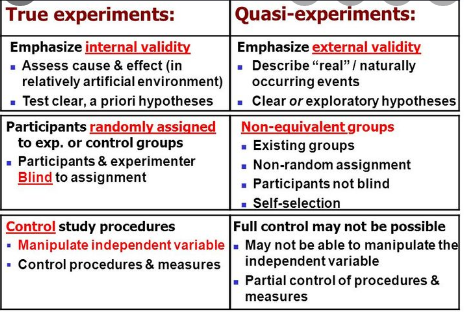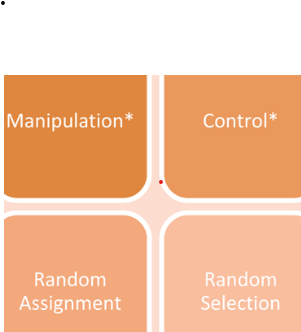In a research study, researchers have the mandate to use different types of search methods. In most cases, the nature of variables and the need of the investigation play a vital role in influencing the criteria for exploration. There are various approaches scientists can apply to analyze and examine the population sample. Each procedure presents its importance thus, investigators evaluate the one that fits with the objectives of the examination. The analysis focuses on exploring the variation between quasi and true experiments in the context of the research study.
Understanding quasi-experiments and True Experiments
Generally, quasi-experiment refers to a search study where researchers perform experimental research without randomly assigning the controls to the sampled population. The term ‘Quasi’ means resemble; therefore, in these investigation, investigators manipulate the independent variables while the participants are not arbitrarily given conditions (Maciejewski, 2020). On the other hand, the true experiment is a type of study whereby the scientists make possible efforts to impose border controls on the sample population apart from the variable being studied (Leatherdale, 2019). In most cases, true experimental studies are conducted in laboratories where researchers have the ability to enact control. Figure 1 below highlights key differences between quasi and true experiments.

Case Study
Researcher conducted a study to determine and evaluate a new technique of teaching calculus to twelve graders. An investigator has two different classes to use for conducting the experiment. In this case, the analyst would perform the search using one class of twelve graders as a treatment group and another category of twelve graders as a control population sample. In this approach, the learners are not randomly assigned to the respective classes by the researcher, making the study be nonequivalent group design. This aspect implies that there is a high likelihood of significant difference amongst the students. For instance, some learners may have external influences such as parent motivation, thus excelling in calculus, or some students were allocated to a given class for disciplinary reasons. If the findings of the investigation indicate variation in calculus knowledge between the two classes, teaching methods or other variables may have caused the discrepancy.
In this research experiment, the random assignment does not completely eliminate the possibility of difference between the study groups but reduces it. Based on the hypothetical case study above, quasi-experimental research is appropriate because it provides higher internal validity (Athey & Imbens, 2022). Similarly, randomizing the students would not be easier; thus, applying the technique is effective to the search study. In addition, it is difficult to impose order control amongst the group since the students have the ability to interact and share calculus knowledge.
When the groups are categorized differently, it is easier for the researcher to explore the results of both classes and compare the outcomes. In the end, experimental investigation, the investigated class, and the control group are compared to effectively evaluate the difference between the two classes (Gage et al., 2019). This will allow the investigator to have deep insight into the causes of variation, thus prompting in developing the best approach to teach calculus.
Converting quasi-experiments and True Experiments
In summary, for the study to be converted into a true experiment, the researcher should formulate a way of grouping the students through randomization and also imposing a control group. Proper manipulation is necessary to understand the correlation between the variables (Miller et al., 2020). The control twelve graders are supposed not to receive any treatment to enable the investigator to identify the correct method of teaching calculus. The diagram below indicates some aspects of true experimentation that are necessary for the study.

References
Athey, S., & Imbens, G. W. (2022). Design-based analysis in difference-in-differences settings with staggered adoption.Journal of Econometrics, 226(1), 62-79. Web.
Gage, N. A., Grasley-Boy, N., Peshak George, H., Childs, K., & Kincaid, D. (2019). A quasi-experimental design analysis of the effects of school-wide positive behavior interventions and supports on discipline in Florida. Journal of Positive Behavior Interventions, 21(1), 50-61. Web.
Leatherdale, S. T. (2019). Natural experiment methodology for research: a review of how different methods can support real-world research. International Journal of Social Research Methodology, 22(1), 19-35. Web.
Maciejewski, M. L. (2020). Quasi-experimental design. Biostatistics & Epidemiology, 4(1), 38-47. Web.
Miller, C. J., Smith, S. N., & Pugatch, M. (2020). Experimental and quasi-experimental designs in implementation research.Psychiatry research, 283, 112452. Web.